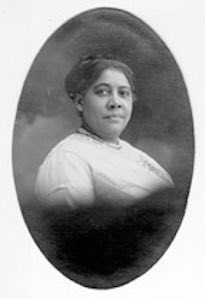Mary Burnett Talbert, civil rights and anti- lynching activist, suffragist, preservationist, international human rights proponent, and educator, was born, raised and educated in Oberlin, Ohio. Upon receiving her college degree from Oberlin, she accepted a position as a high school teacher in Little Rock, Arkansas, where she taught science, history, math, and Latin at the high school and then at Bethel University.
In 1887, she was named assistant principal of Little Rock’s Union High School, the only Black woman to hold such a position and the highest position held by a woman in Arkansas.
Mary Burnett married William Talbert in 1891 and moved with him to Buffalo, NY. She was a founding member of the Phyllis Wheatley Club, the first in Buffalo to affiliate with the National Association of Colored Women’s Clubs. The Club established a settlement house and helped organize the first chapter of the NAACP (1910). In 1901, Talbert founded the Christian Culture Club at the Michigan Avenue Baptist Church.
Talbert also protested the exclusion of Black Americans from the Planning Committee of the Pan-American Exposition. She was instrumental in the founding of the Niagara Movement, pre-cursor to the NAACP (1905). Talbert’s club connections were extensive. In her NACW Presidential years, she transformed the association into a truly national institution with structure and organizational procedures.
Its first national undertaking was the 1922 purchase and restoration of the Frederick Douglass home in Anacostia, MD. She was elected president for life of the Frederick Douglass Memorial and Historical Association.
On the international scene, she sold thousands of dollars of Liberty Bonds during the war, offered classes to Black soldiers and was a member of the Women’s Committee of National Defense. After the war, she was appointed to the Women’s Committee on International Relations, which selected women nominees for position in the League of Nations.
Talbert was a pioneer in international organizing efforts, gaining a voice for Black women and developing Black female leadership. With conscious intent, she bridged the generation of 19th century abolitionists and freedom seekers: Tubman, Douglass, Truth, and others, and the developing civil rights leadership of the 20th century. Addressing the Fifth Congress of the International Council of Women, Christiana,
Norway, 1920, where she was the first Black delegate, Talbert said, “the greatness of nations is shown by their strict regard for human rights, rigid enforcement of the law without bias, and just administration of the affairs of life.”

